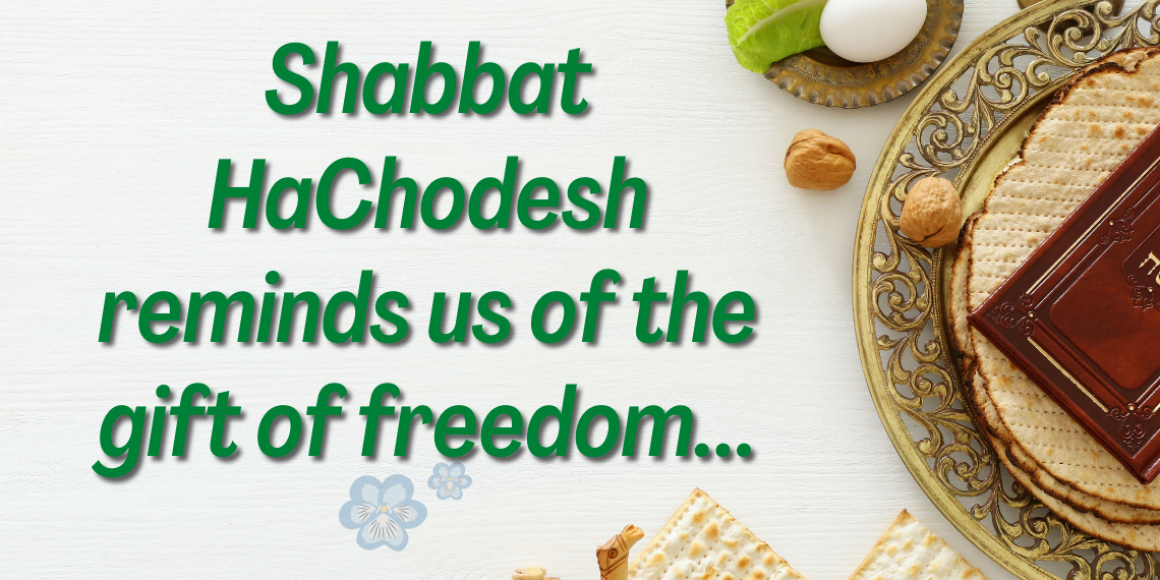
Of Time, Freedom, and Responsibility
This Shabbat (starting Friday evening, April 1) is known as Shabbat HaChodesh, “Shabbat of the month.” Reference is to the start of the Hebrew calendar month of Nisan which, this year, coincides with the beginning of April. In addition to reading the “regular” Torah portion in the cycle of weekly Torah study on Shabbat morning, chapter 12:1-20 of the Book of Exodus is read each year on the Shabbat just before the start of Nisan or, as this year – when the start of the new month coincides with Shabbat – on the first day of the month.
Pausing the narrative of the plagues that struck Egypt, before describing the tenth and final plague, Exodus 12:2 declares: “This month shall mark for you the beginning of the months; it shall be the first month of the year for you.” Control of time is the beginning of the road to freedom. Rashi (1040-1105) comments that Moses was instructed that each new (lunar) month should be proclaimed when the moon appeared as it did at that time. In keeping with this instruction, determination of the onset of Hebrew calendar months, millennia ago, involved direct observation by and the testimony of witnesses presented to the Sanhedrin (high court) in Jerusalem, which would officially pronounce the start of the month.
Time and again, and in various ways, Jewish tradition communicates that, though the world transcends human design, people play an essential role in shaping its realities. The Midrash Tanhuma (Tazria 5), a work compiled in the eighth and ninth centuries, relates that, confronted by the Roman Governor-General Turnus Rufus with the question whether the works of God or humankind are greater, Rabbi Akiba brought his interlocutor stalks of grain and loaves of bread, declaring: “These are the works of the Holy One Blessed is He, and these are the works of Man.” While the loaves of bread are, surely, more delectable, the capacity of humankind to refine the wheat depends on pre-existing conditions. Wheat grows in a world not of human creation; only, however, through human agency is bread produced. Similarly, the cycle of the moon is not regulated by human action; people, however, were to play a role in determining and pronouncing the start of each month and, thereby, establishing the dates of the various holidays described in the Torah.
The exodus from Egypt leads to Mt. Sinai, where all Israel is charged to become a “kingdom of priests and a holy (kadosh) nation” (Exodus 19:6). Freedom from slavery was to give way to the pursuit of holiness, an ongoing quest for godliness. The standard “formula” of blessing in Jewish prayer includes the phrase “asher kiddishanu bemitzvotav” – Who has sanctified us with Your commandments. Performance of a mitzvah, the rabbis who authored this declaration – and those who recite it -- affirm, sanctifies the individual who does it; s/he becomes holy through ennobling action.
“History, as understood by the Torah,” wrote Rabbi Jonathan Sacks, “is the story of how human beings, led only by the sound of a voice, a call, began the long journey, not yet complete, to a promised land and a messianic age where people construct a society that honors the image of God in others, sanctifying life, building families of love and trust, shaping communities by the principles of justice and compassion, and living at peace with their neighbors.” Shabbat HaChodesh reminds us not only of the gift of freedom but of the responsibility to help complete that journey. The narrative of the Book of Exodus, of which the special reading of this shabbat is part, serves, in the words of Rabbi Yitz Greenberg, as an “orienting event,” guiding “toward the Promised Land – an earth set free and perfected.” Shabbat shalom & chodesh tov; wishing you a month of goodness and blessing!
